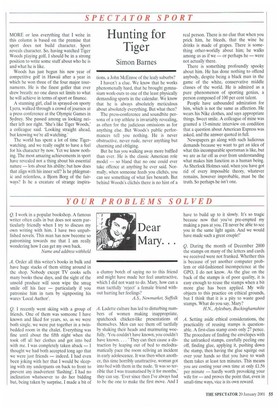Hunting for Tiger
Simon Barnes
MORE or less everything that I write in this column is based on the premise that sport does not build character. Sport reveals character. So, having watched Tiger Woods playing golf, I should be in a strong position to write some stuff about who he is and what he is like.
Woods has just begun his new year of competitive golf in Hawaii after a year in which he won three of the four major tournaments. He is the finest golfer that ever drew breath: no one dares set limits to what he will achieve in terms of sport or finance.
A stunning girl, clad in sprayed-on sporty Lycra, walked through a crowd of journos at a press conference at the Olympic Games in Sydney. She passed among us looking neither left nor right. 'She's like Tiger Woods,' a colleague said. 'Looking straight ahead, but knowing we're all watching.'
The world has spent a lot of time Tigerwatching, and we really ought to have a feel for his character by now, Yet we know nothing. The most amazing achievements in sport have revealed not a thing about his essential nature — lots about his ability; but how does that align with his inner self? Is he phlegmatic and relentless, a Bjorn Borg of the fairways? Is he a creature of strange inspira tions, a John McEnroe of the leafy suburbs?
I haven't a clue. We know that he works phenomenally hard, that he brought gymnasium work-outs to one of the least physically demanding sports in the calendar. We know that he is always absolutely meticulous about absolutely everything. But what then?
The press-conference and soundbite persona of a top athlete is invariably revealing, as often for the judicious omissions as for anything else. But Woods's public performances tell you nothing. He is never obstructive, never rude, never anything but charming and obliging.
But he has you walking away more baffled than ever. He is the classic American role model — so bland that no one could ever take offence at anything he ever said. Normally, when someone feeds you clichés, you can see something of what lies beneath. But behind Woods's clichés there is no hint of a real person. There is no clue that when you prick him, he bleeds, that the wine he drinks is made of grapes. There is something other-worldly about him; he walks among us as if we — or perhaps he — were not actually there.
There is something profoundly spooky about him. He has done nothing to offend anybody, despite being a black man in the game of the white, conservative middle classes of the world. He is admired as a pure phenomenon of sporting genius, a person composed of 100 per cent talent.
People have unbounded admiration for him, which is not the same as affection. He wears his Nike clothes, and says appropriate things. Sweet smile. A colleague of mine was granted a 15-minute interview on condition that a question about American Express was asked, and the answer quoted in full.
Newspapers go along with such ludicrous demands because we want to get an idea of what this incomparable sportsman is like, but we are as far off as ever from understanding what makes him function as a human being. As Sherlock Holmes said, when you have got rid of every impossible theory, whatever remains, however improbable, must be the truth. So perhaps he isn't one.






























































 Previous page
Previous page